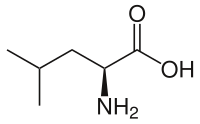
Photo from wikipedia
Maternal embryonic leucine zipper kinase (MELK) activates pathways that mediate aggressive tumor growth and therapy resistance in many types of adult cancers. Pharmacologic and genomic inhibition of MELK impairs tumor… Click to show full abstract
Maternal embryonic leucine zipper kinase (MELK) activates pathways that mediate aggressive tumor growth and therapy resistance in many types of adult cancers. Pharmacologic and genomic inhibition of MELK impairs tumor growth and increases sensitivity to radiation and chemotherapy. On the basis of these promising preclinical studies, early-phase adult clinical trials testing the MELK inhibitor OTS167 are ongoing. To investigate whether MELK is also a therapeutic target in neuroblastoma, we analyzed MELK expression in primary tumors and cell lines, and examined the effects of OTS167 on neuroblastoma growth. In primary tumors, high levels of MELK were associated with advanced stage disease and inferior survival. Higher levels of MELK were also detected in tumorigenic versus nontumorigenic neuroblastoma cell lines, and cells with higher levels of MELK expression were more sensitive to OTS167 than low-MELK expressing cells. OTS167 suppressed the growth of neuroblastoma xenografts, and in a preclinical model of minimal residual disease, survival was prolonged with MELK inhibition. OTS167 treatment downregulated MELK and its target enhancer of zeste homolog 2 (EZH2), a component of the polycomb repressive complex 2 (PRC2) that is known to modulate the DNA damage response. We also show that OTS167 reduced the formation of collapsed replication forks induced by camptothecin or radiation. Taken together, our results indicate that MELK indirectly mediates efficient processing of replication-associated DNA lesions in neuroblastoma, and that OTS167 sensitizes cells to DNA-damaging agents by abrogating this process. Further studies evaluating the activity of combination treatment regimens with OTS167 in neuroblastoma are warranted.
Journal Title: Molecular Cancer Therapeutics
Year Published: 2019
Link to full text (if available)
Share on Social Media: Sign Up to like & get
recommendations!